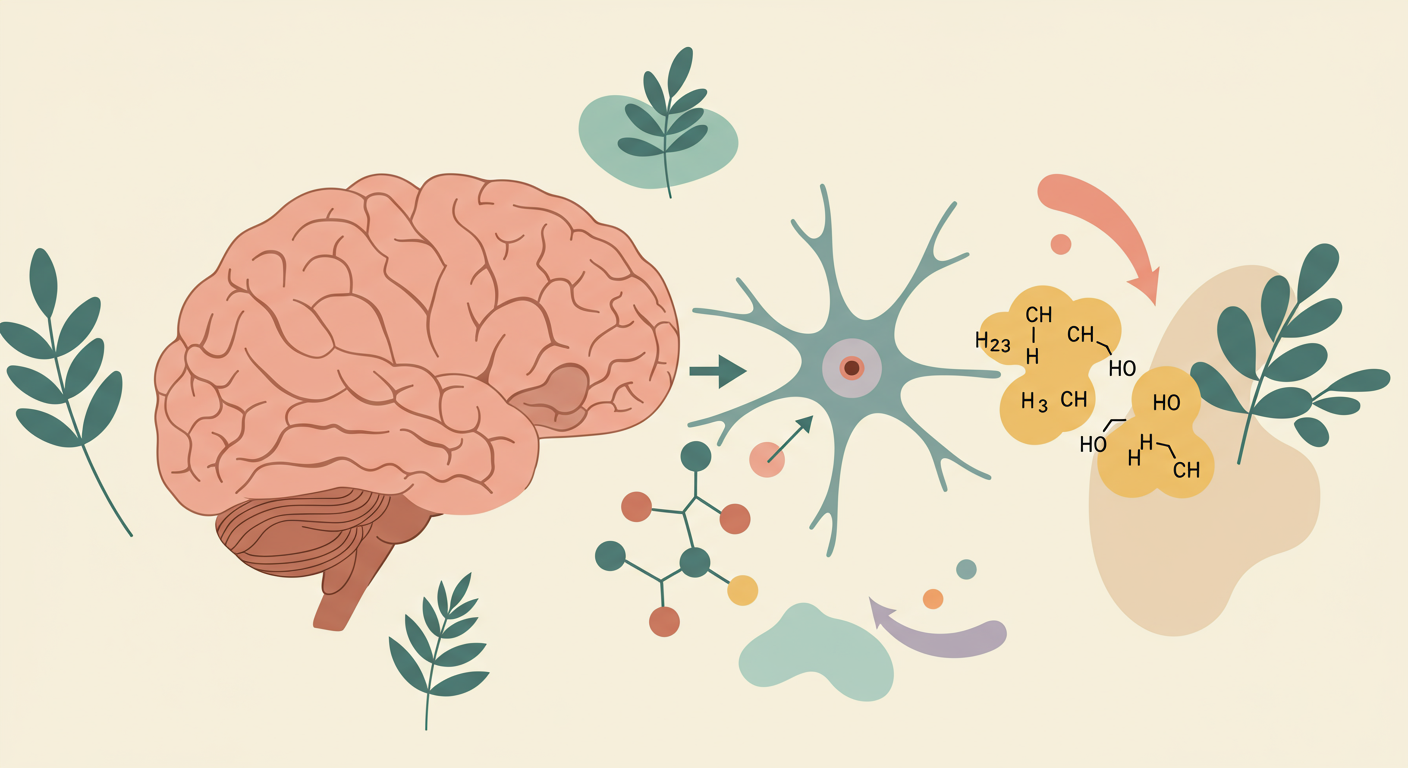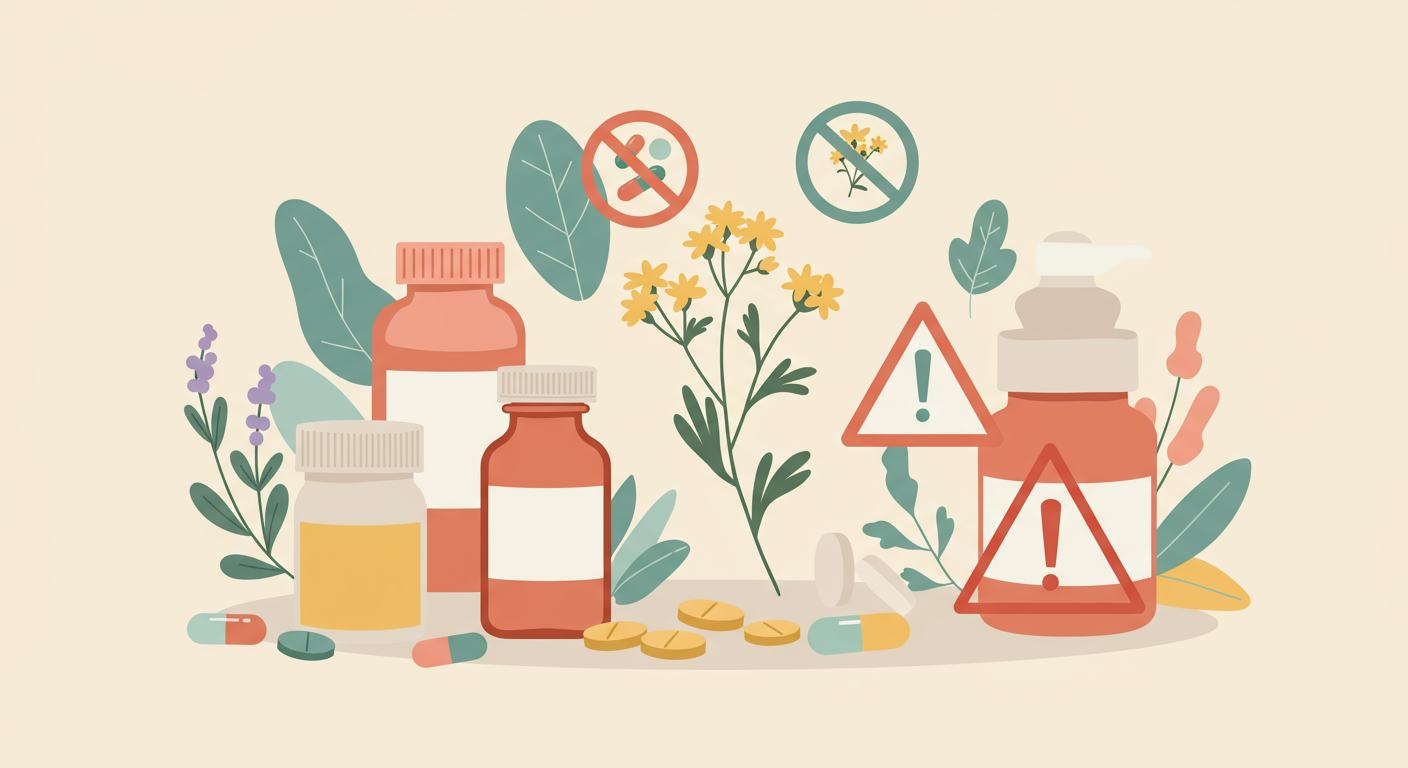St. John's Wort: Your Guide to Nature's Mood Booster
St. John's Wort: Your Guide to Nature's Mood Booster

Unveiling St. John's Wort: Nature's Historical Remedy
St. John's Wort, scientifically known as Hypericum perforatum, is a widely recognized herbal remedy traditionally used to uplift mood and support emotional balance. This article delves into the fascinating history, scientific mechanisms, and evidence-based benefits of St. John's Wort, primarily focusing on its role in managing symptoms of mild to moderate depression and promoting general well-being. We will explore how its active compounds interact with the body, examine the clinical evidence supporting its efficacy, and, most importantly, provide crucial guidance on its safe use, including potential side effects and significant drug interactions, ensuring readers can make informed decisions about incorporating this powerful herb into their health regimen.
What is St. John's Wort?
St. John's Wort, or Hypericum perforatum, is a flowering plant native to Europe and Asia but now found worldwide. Characterized by its bright yellow flowers, which bloom around St. John the Baptist's Day in late June, the plant's leaves contain tiny, translucent dots that look like perforations when held up to the light, hence its species name, 'perforatum'. When crushed, the flowers and leaves release a reddish-purple liquid, leading to its historical association with various mystical and medicinal properties.
For centuries, this resilient herb has held a significant place in traditional medicine. Ancient Greeks, including Hippocrates and Pliny the Elder, recognized its healing qualities, employing it for a range of ailments from nerve pain to wounds and digestive issues. It was also commonly used as a diuretic and for respiratory complaints. During the Middle Ages, its applications expanded, becoming a popular folk remedy believed to ward off evil spirits and offer protection, further cementing its role in both spiritual and physical health practices.
A Glimpse into its Rich History
The tradition of using St. John's Wort persisted through centuries, evolving into a widely accepted herbal remedy, especially in Europe, for nervous conditions and melancholy. Its recognition in modern natural health began to surge in the late 20th century, particularly as research started to explore its potential in managing symptoms of depression. This transition from folklore to pharmaceutical interest highlights the enduring appeal and perceived effectiveness of this plant, paving the way for its current status as one of the most studied and utilized herbal supplements for mood support globally.

The Science Behind the Mood Boost
The efficacy of St. John's Wort in uplifting mood is attributed to a complex interplay of its active constituents, rather than a single compound. While researchers initially focused on hypericin, later studies highlighted hyperforin as a primary contributor to its antidepressant effects. However, it's now understood that the synergistic action of various compounds, including flavonoids, biflavones, and essential oils, collectively contribute to its therapeutic profile.
The precise mechanisms are still being fully elucidated, but current research suggests that St. John's Wort influences several key neurotransmitter systems in the brain. Neurotransmitters are chemical messengers that play a crucial role in regulating mood, sleep, appetite, and other vital functions. By affecting these systems, St. John's Wort can help restore balance, particularly in individuals experiencing mood imbalances.
Key Active Compounds
Among the many compounds found in St. John's Wort, hypericin and hyperforin are considered the most significant for its mood-enhancing properties. Hypericin was initially thought to be the main active ingredient due to its ability to inhibit monoamine oxidase (MAO), an enzyme that breaks down neurotransmitters. However, more recent research indicates that hyperforin likely plays a more prominent role.
Hyperforin acts as an inhibitor of the reuptake of several neurotransmitters, including serotonin, norepinephrine, dopamine, GABA, and L-glutamate. By blocking the reabsorption of these neurotransmitters back into the nerve cells, hyperforin effectively increases their concentration in the synaptic cleft—the space between nerve cells—allowing them to remain active for longer periods. This increased availability of neurotransmitters can lead to improved mood and reduced symptoms of depression.
Neurotransmitter Modulation and Beyond
The ability of St. John's Wort to modulate neurotransmitter levels is similar to the action of some conventional antidepressant medications, such as selective serotonin reuptake inhibitors (SSRIs). However, St. John's Wort has a broader spectrum of action, affecting multiple neurotransmitter systems rather than primarily targeting just one. This multi-target approach may contribute to its efficacy in certain individuals.
Beyond neurotransmitter modulation, St. John's Wort has also been shown to exert anti-inflammatory and neuroprotective effects. Chronic inflammation and oxidative stress are increasingly recognized as factors in the development and progression of mood disorders. By mitigating these processes, St. John's Wort may offer additional benefits for brain health and emotional resilience. Its adaptogenic properties, helping the body adapt to stress, may also contribute to its overall mood-boosting effects.

Evidence for Mood Support: What the Research Says
Numerous clinical trials and meta-analyses have investigated the efficacy of St. John's Wort for depression. A significant body of evidence, particularly from studies conducted in Europe, suggests that St. John's Wort extracts can be effective for the treatment of mild to moderate depressive episodes. These studies have often compared St. John's Wort to placebo or to standard antidepressant medications.
Several comprehensive reviews, including those published by the Cochrane Library, have concluded that St. John's Wort extracts are superior to placebo in patients with major depression and are similarly effective as standard antidepressants, with fewer side effects in some instances. This evidence has led to its widespread acceptance and use as a first-line treatment for mild to moderate depression in several European countries. It is crucial to distinguish between mild/moderate and severe depression; the evidence overwhelmingly supports its use only for the former, and it is not recommended for severe depressive disorders.
Comparing with Conventional Treatments
When directly compared to conventional antidepressant medications (like SSRIs or tricyclic antidepressants) in trials for mild to moderate depression, St. John's Wort has frequently demonstrated comparable efficacy. Patients taking St. John's Wort often report a similar reduction in depressive symptoms. Furthermore, some studies indicate that St. John's Wort may be associated with a lower incidence of certain side effects common to pharmaceutical antidepressants, such as gastrointestinal issues or sexual dysfunction, which can improve adherence to treatment for some individuals.
This makes St. John's Wort an attractive option for those seeking a natural approach, especially if they are sensitive to the side effects of conventional drugs or prefer to start with a less aggressive intervention. However, this does not mean it is free from side effects or interactions, which are critical considerations.
Important Considerations on Efficacy
While the evidence is compelling for mild to moderate depression, it's important to approach these findings with appropriate perspective. The quality and methodology of studies on St. John's Wort vary, and not all trials show uniformly positive results. Additionally, the effectiveness can depend on the specific extract used, as standardization of active compounds is key. Not all St. John's Wort products are created equal; extracts standardized to contain a certain percentage of hypericin and/or hyperforin are typically used in research and are considered more reliable.
Always remember that 'mild to moderate' depression still requires professional assessment. Self-diagnosing or self-treating any form of depression without medical supervision can be risky, potentially delaying effective treatment for more severe conditions. St. John's Wort should be considered as part of a comprehensive mental health plan, ideally under the guidance of a healthcare provider.
How to Use St. John's Wort (and What to Consider)
While St. John's Wort can be a beneficial supplement for mood support, its use requires careful consideration and, ideally, supervision from a healthcare professional. This is especially true given its significant potential for drug interactions. The market offers various forms of St. John's Wort, primarily as extracts, and understanding typical dosages and safety guidelines is paramount.
St. John's Wort is commonly available in capsules, tablets, and liquid extracts. For mood support, most clinical studies have used standardized extracts, typically containing 0.3% hypericin or 3-5% hyperforin. Standardized extracts ensure a consistent amount of the active compounds in each dose, which is important for both efficacy and safety.
Forms and Dosages
The typical dosage found effective in clinical trials for mild to moderate depression ranges from 300 mg three times daily to 600-900 mg once daily, usually taken with meals. However, dosages can vary depending on the specific product, its standardization, and individual needs. It's crucial to follow the dosage instructions on the product label or, more importantly, the advice of your healthcare provider.
When starting St. John's Wort, it's important to be patient. Like conventional antidepressants, it does not typically produce immediate effects. It may take several weeks (2 to 4 weeks) of consistent use to notice significant improvements in mood. If you don't experience benefits within this timeframe, or if your symptoms worsen, consult your doctor. Do not increase the dosage without medical guidance.
Key Safety Considerations
Before you even consider taking St. John's Wort, a consultation with your doctor is non-negotiable. This is particularly vital if you are currently taking any other medications, have pre-existing health conditions, or are pregnant or breastfeeding. Your healthcare provider can help determine if St. John's Wort is appropriate for your specific situation, discuss potential interactions, and monitor your progress.
Consistency is key when taking any supplement for mood. Establish a routine and stick to it to give the herb a fair chance to work. Also, be mindful of your body's response. Keep a journal of your mood, energy levels, and any side effects you might experience. This information will be valuable for discussions with your doctor.
Consult a healthcare professional before starting St. John's Wort, especially if you are taking other medications or have underlying health conditions. It is not a substitute for professional medical advice or treatment.
Potential Side Effects and Drug Interactions: A Critical Overview
While St. John's Wort is generally well-tolerated by many, it can cause side effects and, more importantly, has significant interactions with a wide range of medications. Understanding these risks is crucial for safe use.
Common Side Effects: The most commonly reported side effects are usually mild and include:
- Photosensitivity: St. John's Wort can make your skin more sensitive to sunlight, increasing the risk of sunburn, especially in fair-skinned individuals. It's advisable to use sunscreen and wear protective clothing when exposed to the sun.
- Gastrointestinal issues: Nausea, upset stomach, or diarrhea.
- Fatigue or restlessness.
- Dry mouth.
- Dizziness or headache.
Critical Drug Interactions
The most serious concern with St. John's Wort is its potent ability to interact with numerous prescription and over-the-counter medications. These interactions can significantly alter the effectiveness or increase the toxicity of other drugs, sometimes with severe consequences. The primary mechanism for these interactions is its induction of the cytochrome P450 enzyme system (specifically CYP3A4) in the liver and the P-glycoprotein transporter.
This means St. John's Wort can speed up the metabolism and elimination of many drugs from the body, leading to reduced effectiveness of those medications. Conversely, if combined with drugs that also increase neurotransmitter levels, it can lead to dangerous excessive levels.
Critical Drug Interactions Include:
- Antidepressants (SSRIs, SNRIs, MAOIs): Combining St. John's Wort with these medications can lead to a potentially life-threatening condition called serotonin syndrome, characterized by symptoms like agitation, confusion, rapid heart rate, high blood pressure, dilated pupils, muscle rigidity, and fever.
- Oral Contraceptives (Birth Control Pills): St. John's Wort can decrease the effectiveness of birth control pills, leading to breakthrough bleeding and potentially unintended pregnancy.
- Anticoagulants (Blood Thinners like Warfarin): It can reduce the effectiveness of blood thinners, increasing the risk of blood clots.
- Immunosuppressants (e.g., Cyclosporine, Tacrolimus): Essential for organ transplant recipients, St. John's Wort can drastically reduce the levels of these drugs, leading to organ rejection.
- Antiviral Drugs (e.g., for HIV/AIDS): It can significantly reduce the concentration of certain antiretroviral medications, compromising HIV treatment.
- Chemotherapy Drugs: Interactions can affect the efficacy and safety of cancer treatments.
- Digoxin: A heart medication, its levels can be reduced by St. John's Wort.
- Anti-seizure Medications: Can decrease the effectiveness of drugs used to prevent seizures.
- Migraine Medications (Triptans): Increased risk of serotonin syndrome.
This is not an exhaustive list. Due to the wide range of potential interactions, it is imperative to inform your doctor and pharmacist about all supplements you are taking, including St. John's Wort, before starting any new medication or undergoing surgery.

Who Should Avoid St. John's Wort?
Given its potent effects and significant drug interactions, certain individuals should explicitly avoid St. John's Wort:
- Pregnant or Breastfeeding Women: There isn't enough reliable information to know if St. John's Wort is safe to use during pregnancy or while breastfeeding. It's best to err on the side of caution and avoid it.
- Individuals with Severe Depression: St. John's Wort is not effective for severe depression and could delay appropriate, potentially life-saving treatment. Severe depression requires immediate medical attention and professional intervention.
- People with Bipolar Disorder: St. John's Wort may trigger manic episodes in individuals with bipolar disorder.
- Those with Anxiety Disorders: While some use it for anxiety, it can sometimes worsen anxiety symptoms in susceptible individuals.
- Individuals Undergoing Surgery: St. John's Wort can interfere with anesthesia and other medications used during and after surgery. It should be discontinued at least 1-2 weeks before any planned surgical procedure.
- Anyone Taking Interacting Medications: As detailed above, if you are on prescription medications, especially those for chronic conditions, it is highly likely that St. John's Wort will interact with them.

St. John's Wort is primarily used as an herbal remedy to help alleviate symptoms of mild to moderate depression and to support general mood and emotional well-being.
Like many mood-supportive treatments, St. John's Wort does not work immediately. It typically takes about 2 to 4 weeks of consistent use to notice significant improvements in mood.
Absolutely not. Combining St. John's Wort with antidepressant medications (like SSRIs, SNRIs, or MAOIs) can lead to a dangerous condition called serotonin syndrome, which requires immediate medical attention.
Yes, St. John's Wort can significantly decrease the effectiveness of oral contraceptive pills, potentially leading to breakthrough bleeding and unintended pregnancy. Alternative birth control methods should be used if you are taking St. John's Wort.
Common side effects are usually mild and can include photosensitivity (increased sensitivity to sunlight), gastrointestinal upset, fatigue, dry mouth, and dizziness. Photosensitivity is a notable side effect, making sun protection important.
No, St. John's Wort is not recommended for severe depression. Its efficacy is primarily supported for mild to moderate forms of depression. Severe depression requires immediate professional medical diagnosis and treatment.
Summary and Key Takeaways
St. John's Wort is a powerful herbal remedy with a long history of use for mood support, particularly for individuals experiencing mild to moderate depression. Its potential benefits are backed by a growing body of scientific research, suggesting it can be as effective as some conventional antidepressants for these conditions, often with a different side effect profile. However, its use is far from straightforward and demands a cautious, informed approach.
Key Takeaways:
- Historical and Scientific Roots: St. John's Wort (Hypericum perforatum) has been used for centuries, with modern research highlighting active compounds like hypericin and hyperforin that influence neurotransmitter activity.
- Mood Support: Evidence suggests effectiveness for mild to moderate depression, potentially by affecting serotonin, norepinephrine, and dopamine levels.
- Not for Severe Depression: It is not recommended for severe depressive disorders, which require professional medical intervention.
- Significant Drug Interactions: This is the most critical consideration. St. John's Wort can interact dangerously with numerous medications, including antidepressants (risk of serotonin syndrome), oral contraceptives (reduced effectiveness), blood thinners, immunosuppressants, and HIV medications.
- Potential Side Effects: Common side effects include photosensitivity (increased sun sensitivity), gastrointestinal issues, fatigue, and dry mouth.
- Professional Guidance is Essential: Always consult a healthcare provider before starting St. John's Wort, especially if you are taking any other medications, have underlying health conditions, are pregnant, or breastfeeding. This ensures safe and appropriate use.
- Consistency is Key: If deemed appropriate, consistent use over several weeks is necessary to observe potential benefits.
In conclusion, St. John's Wort offers a natural pathway for those seeking to enhance their mood and alleviate symptoms of mild to moderate depression. However, its potent nature necessitates a thorough understanding of its mechanisms, benefits, and, most critically, its potential interactions and side effects. Informed decision-making, in partnership with healthcare professionals, is paramount to harnessing its therapeutic potential safely and effectively.